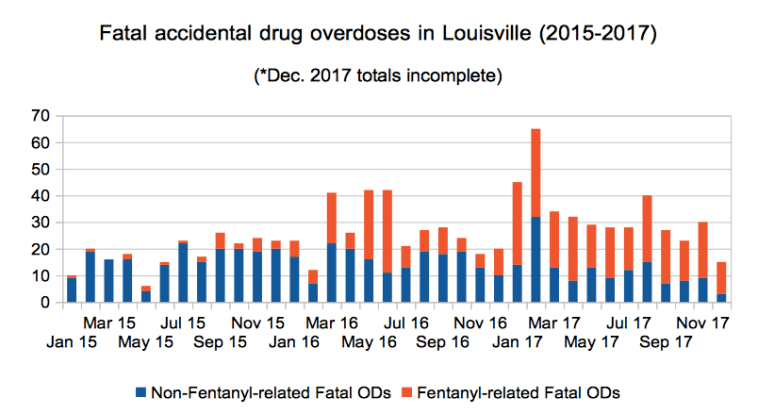The Fischer administration unveiled its two-year action plan to address Louisville’s worsening opioid epidemic on Friday, part of a 78-page report detailing the challenges the city faces and recommended strategies to combat the recent increase in drug overdoses.
By |
The administration of Mayor Greg Fischer unveiled a two-year action plan to address Louisville’s worsening opioid epidemic on Friday, part of a 78-page report detailing the challenges the city faces and recommended strategies to combat the recent increase in drug overdoses.
“Let’s be clear: This is a serious, long-term challenge, and this battle may never be over,” said Fischer at the news conference announcing the report. “But implementing these recommendations will put us on the right path and help us start saving more lives.”
The report, titled “Coming Together for Hope, Healing and Recovery,” was the product of the Metro Department of Public Health and Wellness, stemming from the work groups they initiated last summer to bring together treatment providers and come up with innovative solutions and best practices to combat the opioid crisis.
In addition to detailing the extent of the rising opioid epidemic from 2011 to 2016, the report laid out 10 recommendations to reverse course, focused on providing hope, treatment and a stable recovery for those with a substance abuse disorder.
Dr. Sarah Moyer, the health department’s director and chief health strategist, said these 10 recommendations would need interventions at the public policy, community, organizational and individual levels “in order to reinforce their impact and make sustainable, long-term change.”
“The work is just getting started and it’s still going to take all of us to move it forward,” said Moyer. “Many of the initiatives need funding, more community volunteers and political movement. But when we come together, we foster hope, healing and recovery, and we will overcome this epidemic.”
One of the top priorities is to expand the Living Room Project of Centerstone Kentucky, a pilot program created last year that diverts those with serious mental health or substance abuse issues from jails and emergency rooms, instead connecting them with services and treatment.
Boosted with a $325,000 appropriation from Metro Council last year, the program has already served over 200 people in its first three months and saved taxpayers an estimated $500,000, according to Centerstone’s chief operating officer, Kelly Gannon.
Moyer told Insider Louisville after the news conference that the expansion of the Living Room program would cost $1.4 million, so that instead of just being a place where police can drop off people in need of assistance 24 hours a day, the program can also find services for anyone who walks in off the street looking for help.
Another top priority among the report’s recommendations is for the city to establish new guidelines for sober living houses, part of the larger effort of making the recovery process easier for those who have gone through substance abuse treatment.
At the news conference, Council President David James stated that the city needs to put regulations in place to “protect fragile people that are trying to get help,” as some halfway houses and facilities “simply take advantage of people that are already in a bad situation.”
Moyer added that when people are discharged from court or jail, they are often presented with a list of sober living housing options that include “some that are essentially drug houses, or make people pay a crazy amount of money. So we need guidelines for what we can call a sober living house.”
Meeting the goal of providing hope to those in recovery, the report also recommends making felony expungement more affordable, as many whose addiction led to incarceration have trouble finding stable housing and employment. Sadiqa Reynolds of the Louisville Urban League spoke about the great demand for their new expungement events in west Louisville, but lamented that the steep price tag of $500 for each felony count expungement creates unneeded barriers, a policy that needs to be changed in Frankfort.
Fischer added “$500 is the number that is set in Frankfort. It could be zero. It could automatically be expunged. So while we’re doing tactically what we need to be doing in our city about this issue, let’s also remember to advocate with the state Senate, the state House, the governor to take care of this issue once and for all.”
Another recommendation is to increase harm reduction programs like the health department’s syringe exchange, as well as expand access to naloxone, the drug that can revive someone who has overdosed on opioids. The report recommends adding three mobile syringe exchange sites by next summer, in addition to expanding access to naloxone for workers in libraries, TARC buses, government buildings and businesses in high-risk areas.
The report also recommends expanding peer support in emergency rooms across the city to connect overdose patients with treatment options. University of Louisville Hospital currently has a grant to provide such peer support in person on a 24-hour basis, but Moyer said that with additional funding such staff could be available in hospitals across the city by next spring.
The UofL School of Public Health and Information Science is taking the lead on one recommendation to measure the quality of addiction treatment programs in the city, establishing 10 quality metrics for treatment providers. Moyer noted that there is no other city doing such a study, hoping that quality metrics and data can be in place by the end of 2020. She added that the outcomes of different treatment providers are currently self-reported.
While a number of treatment facilities and organizations in Louisville have begun using medication-assisted treatment (MAT) in recent years as an evidence-based strategy to combat the opioid epidemic, most treatment options throughout the country and state remain abstinence-only, based on the Alcoholics Anonymous 10-step model.
The report recommends that MAT services be expanded to patients in emergency departments and when they are discharged, as well as enforcing ordinances prohibiting MAT facilities from being discriminated against in respect to real estate.
Other recommendations in the report include the development of a 12-month action plan to prevent youth substance abuse, increasing trauma-informed care for young people, developing a public health social media campaign to reduce stigma around substance abuse and treatment, and establishing a task force to determine how to best connect people in recovery with employers.
The report also advocates for public policy changes to allow safe/supervised injection sites based on cities such as San Francisco and Philadelphia, allowing incarcerated individuals to keep their health insurance, preventing those in treatment from facing eviction, and supporting efforts to decriminalize the possession and use of illicit drugs by shifting from a punitive model to a treatment model.
The full report and recommendation can be read below:
Source: Fischer administration unveils two-year action plan to address opioid epidemic – Insider Louisville






